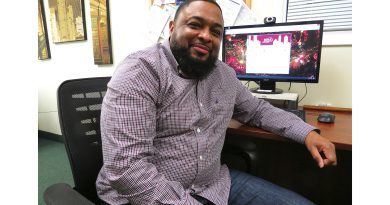Alzheimer’s Assoc. Offers Tips for Supporting Dementia Caregivers
Easing the Load
Currently, there are more than 11 million family members and friends across the country providing care to more than 6 million Americans living with Alzheimer’s disease.
Caring for those living with Alzheimer’s or other dementia poses special challenges for family caregivers. As dementia symptoms worsen, caregivers can experience increased emotional stress, depression, anxiety, and new or worsened health problems. Caregivers often experience depleted finances due to disruptions in employment and paying for healthcare or other services.
“Caring for a person with Alzheimer’s takes longer, lasts longer, is more personal and intrusive than most other diseases, and takes a heavy toll on the health of the caregivers themselves,” said Monica Moreno, senior director of Care and Support for the Alzheimer’s Assoc. “During the course of the disease, caregiving tasks escalate and become more intensive. Alzheimer’s and dementia caregivers are often managing multiple conditions, including memory loss, co-morbidities, loss of mobility, reduced communication skills, and behavioral and personality changes.”
Alzheimer’s Caregiving by the Numbers
• More than 11 million people in the U.S. are providing unpaid care to a person living with Alzheimer’s or dementia.
• Eighty-three percent of the help provided to older adults in the U.S. comes from family members, friends, or other unpaid caregivers.
• Nearly half of all caregivers (48%) who provide help to older adults do so for someone with Alzheimer’s or another dementia.
• Among primary caregivers of people with dementia, more than half take care of their parents.
• Approximately two-thirds of caregivers are women, and one-third of dementia caregivers are daughters.
• Approximately one-quarter of dementia caregivers are ‘sandwich generation’ caregivers, meaning they care not only for an aging parent, but also for children under age 18.
• In 2022, the lifetime cost of care for a person living with dementia was $377,621.
• Seventy percent of the lifetime cost of care is borne by family caregivers in the forms of unpaid caregiving and out-of-pocket expenses.
• Forty-one percent of caregivers have a household income of $50,000 or less.
Source: Alzheimer’s Assoc.
Across the country, 59% of dementia caregivers report high to very high emotional stress due to caregiving, and 38% report high to very high physical stress due to caregiving. Seventy-four percent of dementia caregivers report they are “somewhat concerned” to “very concerned” about maintaining their own health since becoming a caregiver.
To help caregivers balance competing priorities while maintaining their overall health and well-being, the Alzheimer’s Assoc. offers these tips:
• Find time for yourself. It’s normal to need a break from caregiving duties. No one can do it all by themselves. Consider taking advantage of respite care or help from family and friends to spend time doing something you enjoy.
• Become an educated caregiver. Understand the disease, its progression, and accompanying behavioral and physical changes. Know resources in your community that can help.
• Build a support network. Organize friends and family who want to help provide care and support. Access local caregiver support groups or online communities such as ALZConnected to connect with other caregivers. If stress becomes overwhelming, seek professional help.
• Take care of yourself. Try to eat well, exercise, and get plenty of rest. Making sure that you are healthy can help you be a better caregiver.
• Accept changes. Eventually, your loved one will need more intensive kinds of care. Research care options now so you are ready for the changes as they occur.
• Know you’re doing your best. It’s normal to lose patience or feel like your care may fall short sometimes. You’re doing the best you can. For support and encouragement, consider joining an online or in-person support group.
“As difficult as it may be, caregivers need to make their health and well-being an equal priority,” Moreno said. “Maintaining your health can help you be a better caregiver. No caregiver should face this disease alone. The Alzheimer’s Association is here to help.”
The Alzheimer’s Assoc. provides local support and programs to families facing this devastating disease, including a 24/7 helpline staffed by master’s-level clinicians and specialists who are available 365 days a year and can help families navigate a variety of disease-related issues. Call (800) 272-3900.




